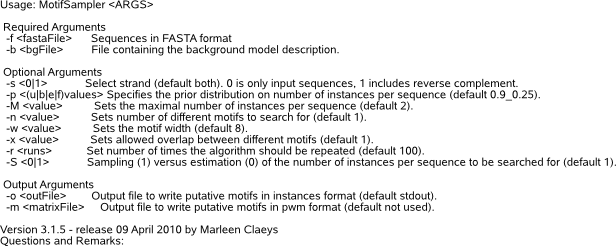To: Main Page

To: Main Page

Page contents:
This page provides access, installation and execution guidelines for the standalone use of the softwares in MotifSuite. |
| Program | Citing |
| CreateBackgroundModel | Publications |
| MotifSampler | Publications |
| MotifRanking | Publications |
| FuzzyClustering | Publications |
| MotifComparison | Publications |
| MotifLocator | Publications |
How to download the standalone executable |
|
We provide access to Linux version 2.6 64bit executables, statically linked against libstdc++6 (gcc version 4.1.2). Normally, they should run on any linux distribution. A 32bit executable can be made available on request. |
For all applications except FuzzyClustering, the executable is the only software to be installed. For FuzzyClustering, you need to install additional supporting software: 1) MCRInstaller.bin (Matlab_Compiler_Runtime) and 2) libClust.tar.gz (a dynamically linked library). |
| Action | Example|Command | |
| Click on the link in table 1 and save the executable (binary file) in <SOFTWARE_PATH> | ||
| Go to directory in which your executable was saved | ~> cd <SOFTWARE_PATH> | |
| Update the executables permissions | eg <SOFTWARE_PATH> ~> chmod 755 MotifSampler | |
| For FuzzyClusterng first install MCR and libClust | SEE MORE INFO BELOW | |
| Check if it works by calling the application without options | eg <SOFTWARE_PATH> ~> ./MotifSampler |
The output should look like this (example for MotifSampler):  This section only applies to FuzzyClustering: The FuzzyClustering executable is dynamically linked against an in Matlab created shared library (libClust.so). You do not need an installed Matlab software neither Matlab license. Instead, you have to install a Matlab Compiler Runtime (MCR version 7.8 (32bit) or 7.9 (64bit)) which is freely available and provided in table 1. The MCR (about 600MB) needs to be installed once, re-installation is only needed when a new libClust library would be released that was created with a Matlab version different from the one you have installed (which we would mention here). Define the path on which you will install MCR and libClust (may be but is not necessarily equal to <SOFTWARE_PATH>): - <MCRCLUST_PATH>: the path on your platform in which you will install MCR and libClust |
| Action | Example|Command |
| Click on the link in table 1 and save the MCR (binary file) in <MCRCLUST_PATH> | |
| Go to directory in which the MCR was saved | ~> cd <MCRCLUST_PATH> |
| Launch the installation of the MCR software | ~> ./MCRInstaller.bin -console |
| It will ask you for 'Destination directory': change the default into <MCRCLUST_PATH>Matlab_Compiler_Runtime/ | eg /home/motif_software/Matlab_Compiler_Runtime/ |
| Wait until this process ends Successfully (this may take a while) | |
| Optionally you can remove the MCRInstaller.bin file (it is 250MB and not needed anymore for further operation) | ~> rm -f MCRInstaller.bin |
| -- | |
| Click on the link in table 1 and save libClust.tar.gz (tar file) in <MCRCLUST_PATH> | |
| Go to the directory in which libClust.tar.gz was saved | ~> cd <MCRCLUST_PATH> |
| Untar the library into <MCRCLUST_PATH> | eg ~> tar -zxvf libClust.tar.gz -C /home/motif_software/ |
| Optionally you can remove the libClust.tar.gz file (it is not needed anymore for further operation) | ~> rm -f libClust.tar.gz |
| -- | |
| Export the library paths to your system environment variable (*) for 64_bit: ~> export LD_LIBRARY_PATH=<MCRCLUST_PATH>Matlab_Compiler_Runtime/v79/runtime/glnxa64/:<MCRCLUST_PATH>libClust |
eg for 64_bit: ~> export LD_LIBRARY_PATH=/home/motif_software/Matlab_Compiler_Runtime/v79/runtime/glnxa64:/home/motif_software/libClust |
| -- | |
| Go to directory in which FuzzyClustering was saved | ~> cd <SOFTWARE_PATH> |
| Verify if the libraries are correctly linked, the output should look like: libmwmclmcrrt.so => <MCRCLUST_PATH>Matlab_Compiler_Runtime/v79/runtime/glnxa64/libmwmclmcrrt.so (0x00002b441f6a0000) libClust.so => <MCRCLUST_PATH>libClust/libClust.so (0x00002b441f89f000) libstdc++.so.6 => /usr/lib64/libstdc++.so.6 (0x00002b441fabd000) libgcc_s.so.1 => /lib64/libgcc_s.so.1 (0x00002b441fdbe000) libm.so.6 => /lib64/libm.so.6 (0x00002b441ffcc000) libc.so.6 => /lib64/libc.so.6 (0x00002b442024f000) libdl.so.2 => /lib64/libdl.so.2 (0x00002b44205a6000) libpthread.so.0 => /lib64/libpthread.so.0 (0x00002b44207aa000) /lib64/ld-linux-x86-64.so.2 (0x00002b441f682000) | ~> ldd FuzzyClustering If the output reports 'not found', verify your LD_LIBRARY_PATH setting (~> echo LD_LIBRARY_PATH) or contact us. |
(*) depending on your platform (bash or shell), you need to use 'export' instead of 'setenv' command. |
Table 1: MotifSuite executables |
| Please provide your email adress at each download so we can post you on recent updates and new releases of our software. |
| Program | Description | Download |
Build your commandline |
|
The command to run an application consists of the application's name followed by a set of switches that relate to the application arguments. A switch is a one letter symbol preceded by the symbol '-' and is separated from its argument by a space. The arguments can be one of the following: |
| Program | link to webpage | link to guidelines | CreateBackgroundModel | arguments | guidelines | MotifSampler | arguments | guidelines | MotifRanking | arguments | guidelines | FuzzyClustering | arguments | guidelines | MotifComparison | arguments | guidelines | MotifLocator | arguments | guidelines |
Feedback |
|
Contact us if you have comments, questions or suggestions or simply want to react on the contents of this guideline. Thank you. |